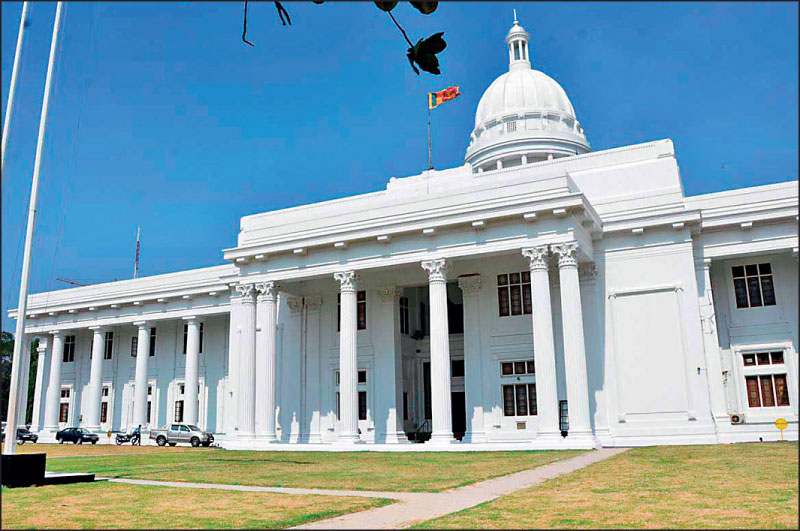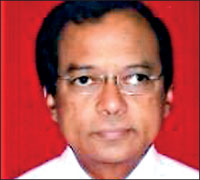Monday Mar 02, 2026
Monday Mar 02, 2026
Monday, 6 June 2022 00:29 - - {{hitsCtrl.values.hits}}

 By Maringa Sumanadasa
By Maringa Sumanadasa
Sri Lanka is facing its worst-ever economic crisis at present. By this time, it has become a political and social crisis as well. No doubt, the country needs short, medium and long-term strategies to overcome this crisis, of which, we are still unable to forecast the duration. There is an urgent need to activate all actors and their resources to overcome the crisis. Many look at outside the country for donors, but for the solution to be sustainable, we must also activate actors within. One such actor is the network of Local Authorities (LAs) in the country.
LAs, the third-tier of public service delivery, require support of Provincial Councils (PCs), the second-tier of public service delivery, for their functioning. PCs, presently function under the Governors, without elected members. However, LAs need to be supervised and in certain aspects, authorised by the Governor and the PC administration. As such, sharing the task and responsibility of the economic recovery with PCs, and through them with LAs, is necessary, in terms of revenue generation, public service delivery and enhancing economic production.
A total of 341 LAs, i.e. 276 Pradeshiya Sabhas (PSs), 41 Urban Councils (UCs) and 24 Municipal Councils (MCs), function under Chairmen/Mayors and a total of 8,719 people-elected members. LAs have their infrastructure, own-source revenue (60%) and grants provided by Government (40%). The question is what role is played by LAs and to what extent they contribute to recover the crisis-hit economy?
Lack of service focus
LAs deliver several public services mandated by the law. Many of their traditional functions have been taken over by line ministries and their agencies of the Government and PCs. Examples are health and education related services, supply of water, electricity, etc. Dedicated functions left to LAs, by now, are limited to a few services such as solid waste management, rural roads, free health clinics, libraries, nurseries, etc. Of about 25 services, on average they provide only 15 services or below, the majority are provided free.
Lack of entrepreneurship
LAs by law can undertake commercial and industrial enterprises to provide products and services to markets to earn revenue. However, such examples are very few and hardly any LAs are jointly doing such activities with the private sector.
Declining revenue
Revenue from property tax, the major source, has declined from 35.6% in 2014 to 17.9% in 2019. The Government grants, on the other hand, have increased from 40.1% to 46.2% to fill the revenue gap. Taxing land and properties enable LAs to capture the enormous wealth generated by the urbanisation. Land prices have increased by many times since the end of the war in 2009. However, PSs have not taken any measure to expand its property tax base in spite of having substantial urban areas concentrated in 300 small towns (formerly Town Councils).
Increased dependency on grants
As we have three levels of service delivery to the public, revenue generation is also entrusted to these three levels. LAs are empowered to tax the citizens to cover the cost of its service delivery. While Government depends on income tax and sales tax, LAs find money to provide services through property taxation. However, revenue generation to meet its cost of service delivery by LAs is very weak. LAs’ revenue amounted to 0.0012% of GDP and 0.02% Government revenue in 2019. As a result, annual grants averaged 35-40% before 2015 increased to 46% by 2019.
Potential revenue avenues
LAs can undertake new ventures either alone or with the private sector as joint ventures by becoming an economic entity/entrepreneur, and enhance its revenue thereby reducing the dependence on grants. At local level, vast potential exists for LAs for developing village markets, production of carbonic fertiliser, provision of leisure and recreation facilities, provision of facilities to tourism, etc. However, we do not see LAs interested in such revenue generation activities.
Engines of growth
LAs, through process of urbanisation and expansion of cities can contribute to the economic growth and development. Theoretically and as experience has evidenced, LAs can be engines of growth. To become partners of the country’s development, LAs should not be mere passive spenders but should be innovative and responsive to the challenges of the day.
Food production
One example for LAs to involve fully in the present process of economic recovery is to engage in enhancing food production. With the fears of a forthcoming severe food scarcity, we do not see any new strategy on the part of PCs and LAs. No efforts from the Government to involve PCs and LAs, and to make LAs a part of the solution, either.
Recommendations
It is proposed that the Government share its present task of recovery of the economy, effectively with PCs, and LAs. As public service delivery is taking place statutorily at three levels of central, provincial and local, there has to be a clear demarcation of responsibilities of economic recovery among the three. There has to be clear revenue targets duly given by the Government budget for the delivery of selected services by the PCs and LAs.
A proper guidance should be given by the budget document, for example, to focus on the dedicated services presently provided by the LAs, undertake one or two new economic activities for which LAs have resources and comparatives advantages, avoid doing work parallelly with other State and private economic actors, and spend within own revenue limits.
LAs should always provide services on cost recovery basis. Hardly earned revenue should not be spent on services already provided by other agencies leading to duplication of work and waste of resources. LAs should focus on services that are most essential, undertake activities that contribute to enhance income and employment of the people living in their jurisdictions. All 8,719 elected members should be truly focusing on the efficient running of the respective LAs with innovative ideas.
(The writer is former Ministry Secretary, present General-Secretary of the Sri Lanka Economic Association. Views expressed are personal and not the views of the Association. He is reachable via [email protected] and mob 0773333207.)